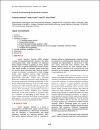Towards understanding the genetics of Autism
Abstract
Autism spectrum disorder (ASD) includes a group of neurodevelopmental disorders that affect communication skills, social interaction and intellectual ability. Despite evidence suggesting a strong genetic link with ASD, the genetic determinant remains unclear. Early studies focusing on candidate genes have shown that several genes associated with neuronal synaptic function are involved in development of ASD. Linkage studies have identified several single nucleotide polymorphisms (SNPs) associated with ASD, and genome-wide association studies have implicated several loci, but failed to recognize a single specific locus with strong significance, indicating heterogeneity in ASD genetic determinants. Detection of de novo copy number variations and single nucleotide variants in several ASD probands has confirmed the genetic heterogeneity of the disease. More interestingly, next generation sequencing approaches have recently identified novel candidate genes and several point mutations in sporadic ASDs, thus increasing our knowledge of ASD etiology. The current review summarizes the findings of recent studies using genetic and genomic approaches to understand the underlying molecular mechanisms of ASD.
Collections
- Biological & Environmental Sciences [940 items ]
Related items
Showing items related by title, author, creator and subject.
-
Universal Genetic Testing for Newly Diagnosed Invasive Breast Cancer
Rezoug, Zoulikha; Totten, Stephanie P.; Szlachtycz, David; Atayan, Adrienne; Mohler, Kristen; Albert, Sophie; Feng, Leila; Lemieux Anglin, Brianna; Shen, Zhen; Jimenez, Daniel; Hamel, Nancy; Meti, Nicholas; Esfahani, Khashayar; Boileau, Jean-François; Prakash, Ipshita; Basik, Mark; Meterissian, Sarkis; Tremblay, Francine; Fleiszer, David; Anderson, Dawn; Chong, George; Wong, Stephanie M.; Foulkes, William D.... more authors ... less authors ( American Medical Association , 2024 , Article)IMPORTANCE Between 5% and 10% of breast cancer cases are associated with an inherited germline pathogenic or likely pathogenic variant (GPV) in a breast cancer susceptibility gene (BCSG), which could alter local and systemic ... -
Genomics of rare diseases in the Greater Middle East
Chekroun, Ikram; Shenbagam, Shruti; Almarri, Mohamed A.; Mokrab, Younes; Uddin, Mohammed; Alkhnbashi, Omer S.; Zaki, Maha S.; Najmabadi, Hossein; Kahrizi, Kimia; Fakhro, Khalid A.; Almontashiri, Naif A. M.; Ali, Fahad R.; Özbek, Uğur; Reversade, Bruno; Alkuraya, Fowzan S.; Alsheikh-Ali, Alawi; Abou Tayoun, Ahmad N.... more authors ... less authors ( Nature Research , 2025 , Article)The Greater Middle East (GME) represents a concentrated region of unparalleled genetic diversity, characterized by an abundance of distinct alleles, founder mutations and extensive autozygosity driven by high consanguinity ... -
The impact of genetic and non-genetic factors on warfarin dose prediction in MENA region: A systematic review
Bader, Loulia Akram; Elewa, Hazem ( Public Library of Science , 2016 , Article Review)Background Warfarin is the most commonly used oral anticoagulant for the treatment and prevention of thromboembolic disorders. Pharmacogenomics studies have shown that variants in CYP2C9 and VKORC1 genes are strongly and ...



